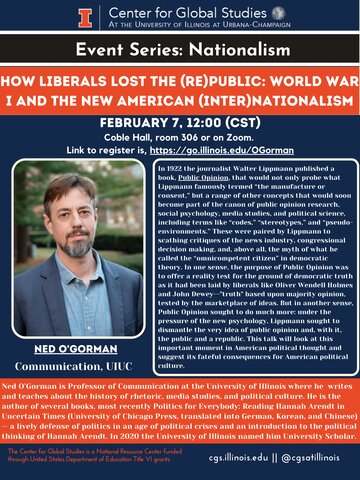
Please join CGS for a talk by Ned O'Gorman (UIUC) on February 7th, at 12 PM (CST), in Coble Hall, 306, and on Zoom for his lecture, "How Liberals Lost the (Re)public: World War I and the New American (Inter)nationalism".
In 1922 the journalist Walter Lippmann published a book, Public Opinion, that would not only probe what Lippmann famously termed “the manufacture or consent,” but a range of other concepts that would soon become part of the canon of public opinion research, social psychology, media studies, and political science, including terms like “codes,” “stereotypes,” and “pseudo-environments.” These were paired by Lippmann to scathing critiques of the news industry, congressional decision making, and, above all, the myth of what he called the “omnicompetent citizen” in democratic theory. In one sense, the purpose of Public Opinion was to offer a reality test for the ground of democratic truth as it had been laid by liberals like Oliver Wendell Holmes and John Dewey--"truth" based upon majority opinion, tested by the marketplace of ideas. But in another sense, Public Opinion sought to do much more: under the pressure of the new psychology, Lippmann sought to dismantle the very idea of public opinion and, with it, the public and a republic. This talk will look at this important moment in American political thought and suggest its fateful consequences for American political culture.
Ned O’Gorman is Professor of Communication at the University of Illinois where he writes and teaches about the history of rhetoric, media studies, and political culture. He is the author of several books, most recently Politics for Everybody: Reading Hannah Arendt in Uncertain Times (University of Chicago Press, translated into German, Korean, and Chinese) — a lively defense of politics in an age of political crises and an introduction to the political thinking of Hannah Arendt. In 2020 the University of Illinois named him University Scholar.